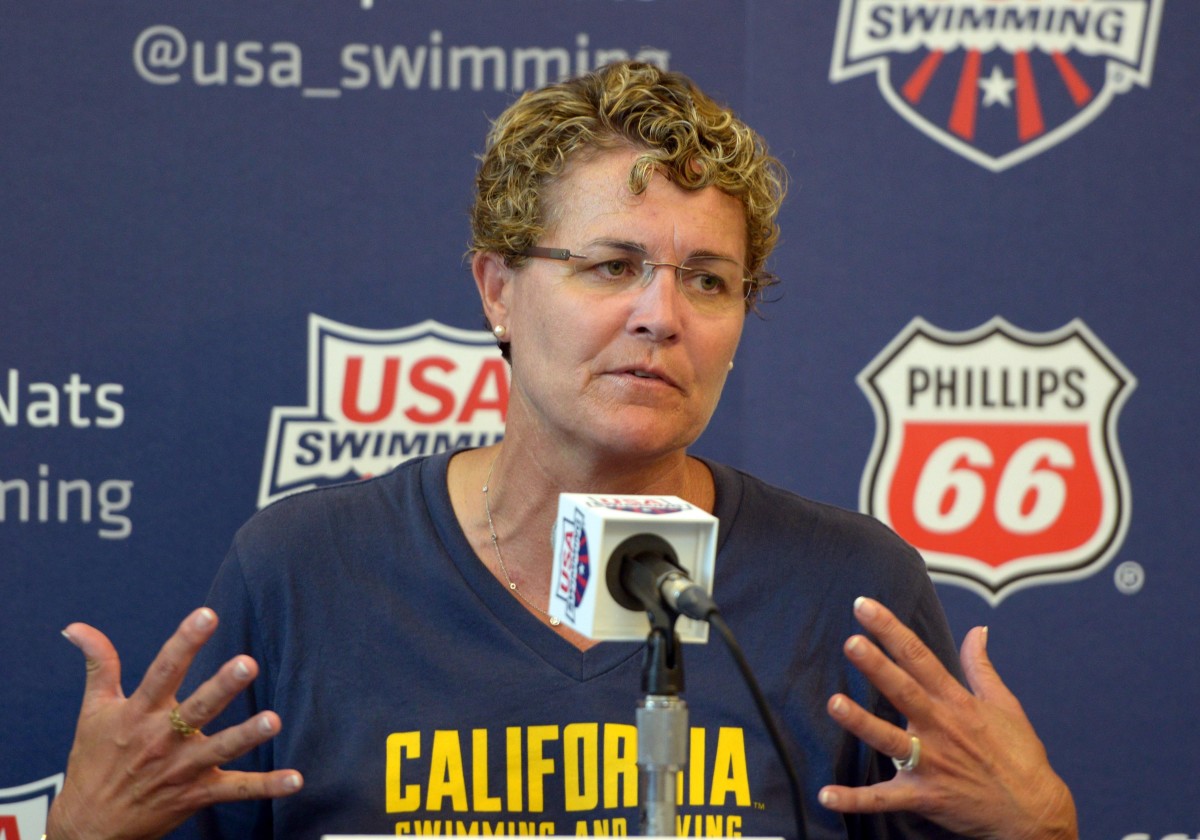Essay: As a Swimmer at Cal, I Observed Coach Teri McKeever’s Abusive Behavior Firsthand

Swimming for Cal was a lifelong dream of mine. I vividly remember the excitement of getting my first recruiting call from its legendary swim coach, Teri McKeever. In my mind, she was offering me the opportunity of a lifetime: to study at a world-class academic institution while swimming for one of the nation’s most successful collegiate programs. The prospect of my becoming part of the Cal swimming legacy filled my imagination and motivated me.
When I arrived as an 18-year-old freshman, I encountered a shocking reality. Almost immediately, I began witnessing Teri’s verbally abusive behavior on the pool deck. She would target a small group of my teammates and systematically isolate these women from the rest of the team. She would yell at them throughout our daily practices and routinely attack their characters. She portrayed them to the rest of us as lazy, not working hard enough through injuries or other problems.
- Related: SafeSport Investigating McKeever After Abuse Allegations
- Related: Cal Swimmers Accuse Coach of Verbal Abuse, per Report
Her actions seemed extreme in the aggregate but not much worse than some of my previous coaches. Her success, and the constant reminders of Cal’s Olympic heritage, created an aura of invincibility that initially convinced me that this form of discipline and control was required to vie for a national title. In the beginning, it made sense in my mind that some teammates were simply not living up to the standard of excellence that the program demands.
These women were my classmates and friends, and over time I began to see the effect that Teri’s behavior had on them. They cowered at her wrath and inevitably inferred that there was something wrong with them. Whatever Teri made fun of or chastised, my friends would focus on fixing, even if they couldn’t because the problems were physical—challenges with Crohn’s disease, eating disorders, and shoulder and ankle injuries. Many of her targets developed mental health problems and began doubting themselves. Were they being too sensitive to their injuries? Were they letting their teammates down? I was relieved that I wasn’t a target, but my stomach churned at the thought of living in their shoes.

In the beginning, I was terrified to speak out and I felt like I had no voice. Some of my teammates would often reinforce Teri’s message, contributing to the marginalization of the victims. Others on the team rationalized it by telling me that “Teri is always like this,” and suggested that the best course would be to stay off her bad side. When my teammates explained away the abuse, it made me question my own values and my own sanity.
Now, I blame myself for not seeing sooner that Teri’s criticisms and attacks were systematic. Watching Teri reduce a teammate to tears in the middle of practice happened so many times that it became normalized. These episodes were never addressed; we would just swim through it all.
As time went on, I realized that Teri’s manipulation had a stronghold over the entire team. She elevated the swimmers she liked to positions of power and then used them to enforce her will and isolate those on her s--- list. All of us feared the consequences of a minor misstep. Trivial mistakes, such as forgetting a piece of gear or wearing the wrong-colored Cal T-shirt could warrant an extreme reaction from Teri. Team members who openly disagreed with her could expect her wrath, so only a few people ever stood up for the women who were being bullied.
Watching a teammate getting belittled to the point of despair and knowing there was nothing I could do to stop it was the most powerless I’ve ever felt in my life.
During my senior year, I was elevated to a leadership position within the team. I saw this as my opportunity to stand up for my teammates and fix the practice of Teri using her captains as her prison guards. However, kindness was not a quality Teri appreciated in a leader. I recall being reprimanded for comforting a crying teammate or “wasting my energy” on someone who “didn’t bring value to the team.” On multiple occasions, she implied that care for others inhibited my own swimming and insisted that I focus on myself. She portrayed some of my teammates as vampires who were sucking the life out of me and giving me nothing in return. Maybe she wanted her victims to feel alone in their struggles.
But she could not dissuade me from helping my friends through some of the darkest times of their lives. The hours I spent offering advice and consolation were emotionally exhausting to me, but well worth it. Somehow, Teri failed to comprehend something that I knew. It wasn’t my teammates’ fault I was spending so much energy this way. It was hers.
I am only now beginning to realize how much she messed with my head. She would scream at and berate my teammates for not swimming fast enough and then moments later would stand in front of the whole team to say that above all, she cared that we were “kind to ourselves and proud of the women we saw in the mirror.”
I experienced the manipulation up close, particularly during my one-on-one meetings with Teri. She would begin these meetings in an angry and defensive state, often blaming me for whatever corrective issues I brought to light. Then, as each meeting progressed, her tone would soften, and the narrative would shift. She would compliment me, telling me how proud she was of me and what a great leader I was becoming. I often left these encounters confused. I wanted to feel optimistic that she understood and appreciated my advice, and that things were going to get better. I needed to believe that I hadn’t chosen the wrong team and failed at the most important decision of my young life.
I blame myself for taking so long to see the situation clearly while I was inside of it. When Teri would broadcast her specific narrative, I believed it, because she was the experienced, accomplished coach, and I was a naive kid, out on my own for the first time. She understood the power imbalance, and she exploited it.
I know that several previous and current team members say they had positive experiences with Teri, and they certainly may have. I also know every single member of my team witnessed Teri’s abusive behavior. Just because some of the people on the team were not directly affected by the abuse does not mean that it did not happen.
There is no excuse or justification for the way that Teri treated people. No amount of personal swimming success will outweigh the harm she has done unto others. No one deserves to be treated like that, especially by someone who is supposed to be a mentor, a leader and the ultimate life coach. I hope that with exposure, more people can learn that mental health and happiness will always be more important than a time on a stopwatch.
Editors’ note: Sports Illustrated requested comment from McKeever in response to the allegations in this essay. SI was directed to lawyer Thomas Newkirk, who is representing McKeever and describes himself as a “specialist in implicit bias.” Newkirk's response was condensed to more specifically address what is alleged in the essay.
“Teri McKeever asked me to respond to this Essay and other claims about her, not simply to deny claims as lawyers do, but to educate on the challenges facing female coaches around the country.
“These allegations are similar to a number of other bias-driven claims leveled primarily at female coaches. These student-athlete complaints are directed at women and label female coaches as bullies for engaging in normal coaching behavior. This is a national epidemic that is mowing down great female coaches, undermining women’s rights, and threatening the future of the profession of coaching. … I have identified 200 female coaches and counting who are simply coaching just like men but are being mowed down by bias-driven complaints."
Newkirk described the essay as nonspecific and wrote that its allegations are “focused on the emotions and feelings of the athletes rather than McKeever’s actual behavior. They are filtering their feelings and the behavior of their female coach via a lens forged by our expectations of what women are supposed to do, compared to what men are supposed to do.”
